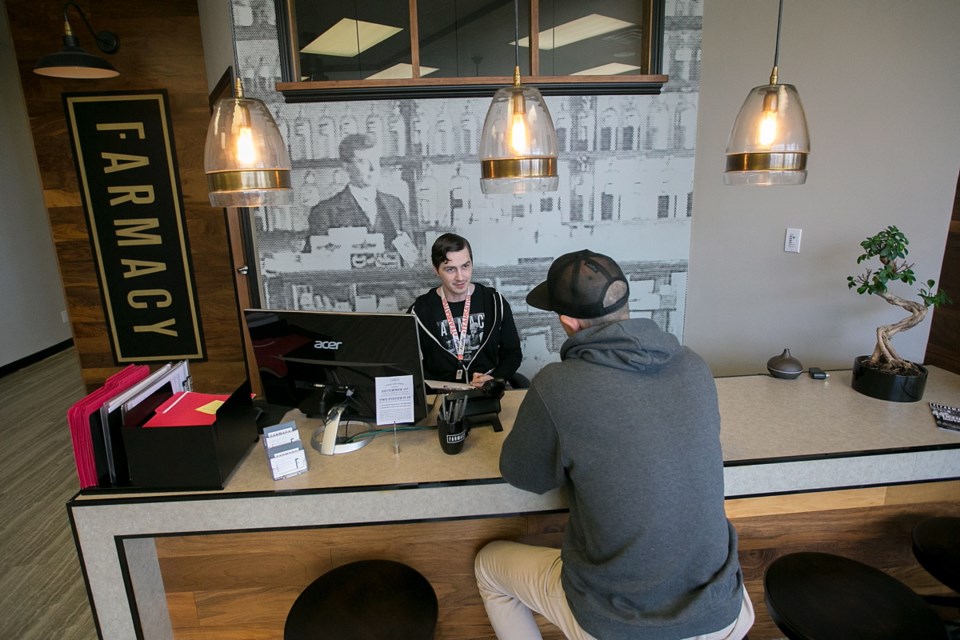 The B.C. government has barred the sale of “snacks” in all the new retail marijuana shops that will start opening legally this summer.
The B.C. government has barred the sale of “snacks” in all the new retail marijuana shops that will start opening legally this summer.
Only cannabis and cannabis accessories will be on the shelves, which overlooks the fact that snacks are the No. 1 cannabis accessory. They go together like alcohol and fist fights.
The prohibition is one of several details Public Safety Minister Mike Farnworth released Monday. Countless more will come out in the next few months before the new era of legal cannabis arrives in Canada on July 1. Farnworth said the government’s adaptation will carry on for a long time after that. And a lot of the further details will involve municipal governments, which have significant say in shaping the retail landscape and have been grappling with how to do so.
July is only the beginning, Farnworth said. All governments will be assessing and refining the regimes being put in place for months and years to come.
The B.C. one taking shape looks to be a middle-of-the-road approach comparable to what other provinces are putting together. Cannabis will be sold in both public and private stores, but only the government-run side will be able to offer online sales. Various sensible restrictions are imposed, but public use will be allowed, although not in high-traffic areas like parks or beaches. Other jurisdictions allow use only in private dwellings.
Interest groups urged Farnworth to allow cannabis to be sold in through B.C. liquor stores, but he was warned off that idea by public health officials who didn’t want to see alcohol and marijuana available together. Very few jurisdictions are going that route, so the government stores will be stand-alone cannabis-only shops. And there are no distance limits from schools or other retailers, although municipalities can set them.
The decision to sell separately from alcohol will involve building a brand-new network of dozens of government stores from a standing start. A separate wholesale system is also planned.
That is only one part of the tens of millions in up-front costs B.C. will incur, well before it starts bringing income in, by way of sales and taxes.
Legalization also involves a big new police enforcement push against drivers under the influence of cannabis that’s going to be expensive to set up. A big public education campaign and an addiction awareness campaign have been promised. It will be funded by cannabis revenue, but has to get underway before those revenues start coming in.
Big administration costs are expected, particularly in of licensing new retailers. There is no cap on how many can apply and Farnworth said the “gold rush” into the commercial sphere is already well underway. The licence and application fees haven’t been set yet.
For years, the single biggest selling point for legalization was that it would get organized crime out of the trade. There were some details released Monday that suggest it’s not as simple as was claimed.
Operators of cannabis dispensaries that are now illegal will not be prohibited from getting a licence.
A background paper said that won’t exclude applicants from consideration. “All applicants will be assessed using the same evaluation criteria. ... Persons who have operated dispensaries prior to legalization will not receive preferential treatment.”
As well, having a criminal record will not exclude applicants from getting a licence. They’ll be considered case by case, although “associations with organized crime will exclude a person from becoming a licensee.”
Legalized cannabis could easily follow the prohibition model, where criminal bootleggers converted to the legitimate model and over time became respectable.
Just So You Know: Recreational and medical marijuana are two separate worlds in B.C.’s eyes, with the federal government responsible for most aspects of the latter. To keep the worlds separate, the new legal shops can’t use words like “pharmacy, apothecary or dispensary.”
And although parents can shop in liquor stores with children in tow, kids will be barred from cannabis stores.



